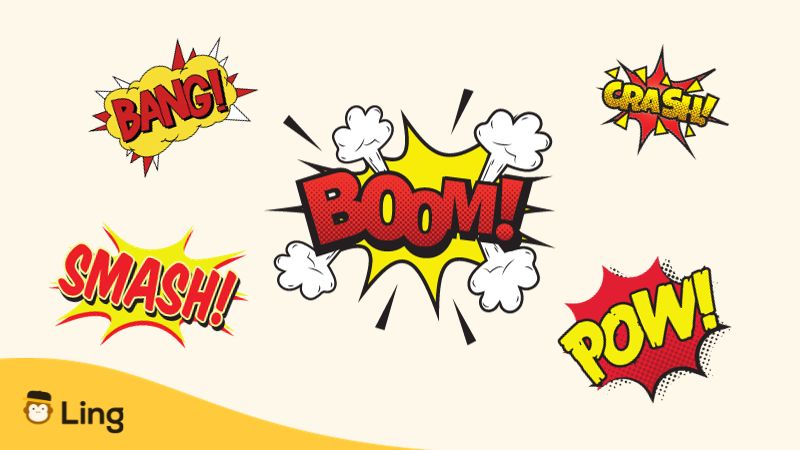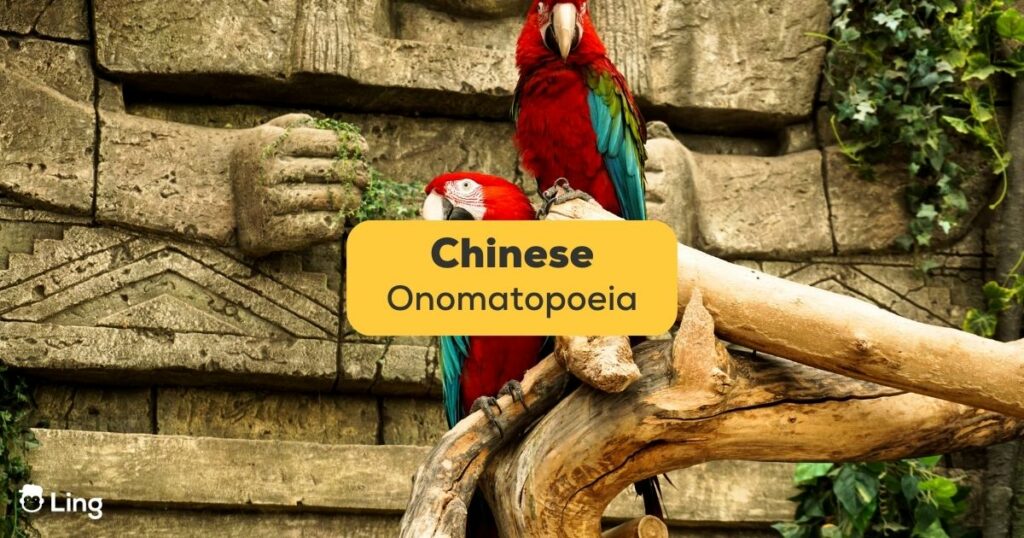Chinese onomatopoeia, or “象声词” (xiàngshēngcí) in Mandarin, is a fascinating linguistic phenomenon that adds a splash of vividness to the Chinese language. These are words that imitate sounds, making conversations and literature more expressive and engaging.
In this article, we’ll explore the world of onomatopoeia in Chinese, so you can infuse your language with the magic of these expressions, including those that mimic the sounds of our animal friends!
Let’s discover the rich onomatopoeia vocabulary in the Chinese language.
What Is Chinese Onomatopoeia?
Chinese onomatopoeia, like its English counterpart, are words that imitate real-world sounds. Like “woof” for a dog’s bark, which in Chinese would be “汪汪” (wāng wāng). Onomatopoeic words try to phonetically replicate sounds, and Chinese onomatopoeia, of course, utilizes Chinese characters to do so.
Adding onomatopoeia into your day-to-day conversations enhances your language skills while also leaving a lasting impression on native speakers. It’s like tempering your word salad with a dash of localization. Whether it’s describing your pet’s behavior or the wildlife you encounter, these words for animal sounds make your language come alive.
In daily conversations, Chinese onomatopoeic words create a vivid and descriptive exchange.
For example: 今天的狗汪汪叫得很大声 (jīntiān de gǒu wāng wāng jiào dé hěn dàshēng) – The dogs are barking ‘woof woof’ loudly today.
The use of “汪汪” (wāng wāng) vividly conveys the sound of dogs barking, enhancing the listener’s experience and creating engaging conversations.
We’ve compiled a bunch of examples for you to get familiar with this language wonder. So let’s take a look at them!

Animal Sounds In Chinese Onomatopoeia
Chinese onomatopoeia can represent many things, like natural sounds, animal sounds, human actions, and emotional expressions. First, as it is simpler, let’s dive into the intriguing world of animal sounds in Chinese onomatopoeia and compare them with their English equivalents.
| English | Chinese | Pronunciation |
|---|---|---|
| woof | 汪汪 | wāng wāng |
| moo | 哞 | mōu |
| awoo | 嗥/嚎 | háo |
| roar | 吼 | hǒu |
| cock-a-doodle-doo | 喔喔喔 | ō ō ō |
| tweet | 吱吱 | zhī zhī |
| meow | 喵喵 | miāo miāo |
| oink | 哼哼 | hēng hēng |
| hiss | 嘶嘶 | sī sī |
Other Examples Of Chinese Onomatopoeia
For the rest of the examples, we’ve separated them by the number of characters they use in the Chinese language. We’ll go from simple to more complex. Let’s start!
One Character Words In Chinese Onomatopoeia
These first onomatopoeic words are as simple as the animal sounds we just saw, as they are one-word characters.
| English | Chinese | Pronunciation |
|---|---|---|
| ah! | 啊 | à |
| huh? | 啊 | á |
| eh? | 诶 | éi |
| eek! | 呀 | ya |
| wow! | 哇 | wa |
| pop! | 啪 | pā |
| oh? | 哦 | ó |
| oh? | 哦 | ò |
| hoy! | 嗬 | hē |
| yo | 唷 | yō |
| alas | 唉 | ài |
| sigh | 吁 | yù |
| er | 呃 | è |
| la | 啦 | la |
| hush | 嘘 | xū |
| bah | 呜 | pēi |
| boom! | 嘭 | pēng |
Two Character Words In Chinese Onomatopoeia
Now, it’s time to learn two character words!
| English | Chinese | Pronunciation |
|---|---|---|
| pssst | 咝咝 | sī sī |
| haha | 哈哈 | hā hā |
| hehe | 呵呵 | hē hē |
| chuckle/giggle | 咯咯 | gē gē |
| hey hey | 嘿嘿 | hēi hēi |
| hee hee | 嘻嘻 | xī xī |
| ho ho (online laughter) | 吼吼 | ho ho |
| tsk | 啧啧 | zé zé |
| grunt | 咕哝 | gū nóng |
| oh no/ come on | 啊呀 | ā yā |
| aha! | 啊哈 | a ha |
| oops/ whoops | 哎呀 | āi ya |
| ow/ ouch | 哎哟 | āi yō |
| whoa! | 哇塞 | wa sāi |
| splash | 哗哗 | huā huā |
| flowing water sound | 潺潺 | chán chán |
| rustle, leaves blowing in the wind | 沙沙 | shā shā |
| thump, heavy dull sound (knock on the door) | 咚咚 | dōng dōng |
| sizzle, the sound of deep-frying | 滋滋 | zī zī |
| rumbling sound; like thunder, sounds of a distant battle | 轰隆 | hōng lóng |
| crash | 哗啦 | huā lā |
| achoo! | 阿嚏 | ā tì |
| whoosh | 呼咻 | hū xiū |
| snore | 呼噜 | hū lū |
| panting | 呼哧 | hū chī |
| plop, the sound of an object falling into the water | 啪哒 | pā dā |
| snap, sudden sharp noise | 咔嚓 | kā chā |
| creaking sound | 嘎吱 | gā zhī |
| tick-tock | 滴答 | dī dā |
Four Character Onomatopoeia
And we’ve come to the more complicated phrases, but don’t worry, you can beat them with a little practice!
| English | Chinese | Pronunciation |
|---|---|---|
| The noise of talking, gossiping, chatter | 叽叽呱呱 | jī jī guā guā |
| Mutter to oneself | 嘟嘟囔囔 | dū dū nāng nāng |
| The sound of something colliding (especially to describe the sound of the ping pong ball in table tennis) | 乒乒乓乓 | pīng pīng pāng pāng |
| The sound of something jumping or dropping one by one into the water | 扑通扑通 | pū tōng pū tōng |
| A conversation among some people that others couldn’t hear clearly | 叽里咕噜 | jī li gū lū |
| Someone’s voice talking annoyingly loud | 叽里呱啦 | jī li guā lā |
| The sound of firecrackers | 劈里啪啦 | pī lǐ pā lā |
| The sound of rain pouring or something collapsing | 稀里哗啦 | xī lǐ huā lā |
| The sound of metal or porcelain objects clashing | 丁零当啷 | dīng ling dāng lāng |
The Wonders Of Chinese Onomatopoeia
Chinese onomatopoeia, with their unique approach to depicting sounds, are gems in the world of linguistics. As you explore the world of animal sounds and other onomatopoeic expressions, you’ll discover a rich tapestry of auditory experiences that will elevate your language skills and enrich your cultural understanding.
Start Learning Chinese With Ling!
Want to learn Chinese in a playful and easy way? The Ling app is here for you! It offers more than 60 foreign language courses, including Chinese!
The Ling app can help you learn how to write Chinese characters, understand native speakers, pick up their pronunciation, and do many mini-activities to learn vocabulary. You can even review what you have learned at the end of each lesson. And that’s not all! You can practice your pronunciation and conversational skills by talking to our friendly chatbot.
All you have to do is download the Ling app on your mobile device from the Play Store or App Store to start learning now!
By the way, don’t forget to visit Ling’s Chinese blog weekly to learn more about this culture and its language!























